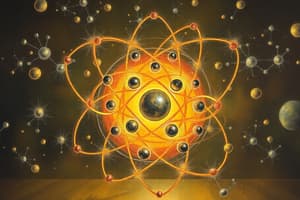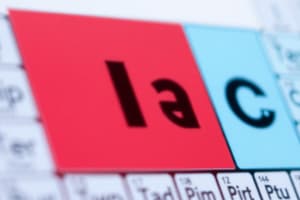Podcast
Questions and Answers
Which of the following elements has the atomic number 1?
Which of the following elements has the atomic number 1?
- Lithium
- Helium
- Oxygen
- Hydrogen (correct)
What is the symbol for Nitrogen?
What is the symbol for Nitrogen?
- No
- Ne
- Ni
- N (correct)
Which of the following is a type of compound?
Which of the following is a type of compound?
- Hydrogen
- Carbon
- Sodium
- Oxide (correct)
What are the two types of pure substances?
What are the two types of pure substances?
Which of the following is NOT a type of mixture?
Which of the following is NOT a type of mixture?
Inert gases need other elements to be stable.
Inert gases need other elements to be stable.
What is an example of a homogeneous mixture?
What is an example of a homogeneous mixture?
Match the following elements with their symbols:
Match the following elements with their symbols:
The atomic number of Oxygen is _____
The atomic number of Oxygen is _____
What type of elements are metals?
What type of elements are metals?
Sulfur is a metal.
Sulfur is a metal.
Flashcards
Chemistry
Chemistry
The central science, focusing on the study of matter and its properties.
Elements
Elements
Simplest forms of matter; cannot be broken down chemically.
Matter
Matter
Occupy space and has mass.
Pure Substances
Pure Substances
Signup and view all the flashcards
Compounds
Compounds
Signup and view all the flashcards
Acids
Acids
Signup and view all the flashcards
Bases
Bases
Signup and view all the flashcards
Mixtures
Mixtures
Signup and view all the flashcards
Heterogeneous Mixtures
Heterogeneous Mixtures
Signup and view all the flashcards
Homogeneous Mixtures
Homogeneous Mixtures
Signup and view all the flashcards
Solutions
Solutions
Signup and view all the flashcards
Study Notes
First 20 Elements
- Hydrogen (H), atomic number 1; Helium (He), atomic number 2
- Lithium (Li), atomic number 3; Beryllium (Be), atomic number 4
- Boron (B), atomic number 5; Carbon (C), atomic number 6
- Nitrogen (N), atomic number 7; Oxygen (O), atomic number 8
- Fluorine (F), atomic number 9; Neon (Ne), atomic number 10
- Sodium (Na), atomic number 11; Magnesium (Mg), atomic number 12
- Aluminum (Al), atomic number 13; Silicon (Si), atomic number 14
- Phosphorus (P), atomic number 15; Sulfur (S), atomic number 16
- Chlorine (Cl), atomic number 17; Argon (Ar), atomic number 18
- Potassium (K), atomic number 19; Calcium (Ca), atomic number 20
Introduction to Chemistry
- Chemistry is known as the central science, focusing on the study of matter.
- Pure substances consist of elements and compounds.
- Inorganic elements include all except carbon; however, exceptions are CO2, CO, CO3^-2, and CO^-1.
Types of Elements
- Elements are the simplest forms of matter.
- Types include:
- Metals: Found in groups IA-IIIA and all transition metals (B groups)
- Non-metals: Located in groups VA-VIIA
- Metalloids: Group IVA
- Inert Gases: Noble gases that are stable without needing other elements.
Matter
- Matter occupies space and has mass.
- Types of matter:
- Pure Substances: Composed of only one type of atom or molecule; further divided into elements and compounds.
- Mixtures: Combinations of pure compounds.
Pure Substances
- Made solely from one type of atom or molecule.
Types of Compounds
- Compounds consist of two or more different elements chemically joined.
- Types include:
- Acids: Formed from hydrogen (H) and a negative radical; characterized by having "acid" in their name.
- Bases: Formed from metals and hydroxides (OH).
- Oxides: Composed of non-metals with oxygen (non-metallic) or metals with oxygen (metallic).
- Salts: Result from the combination of metals and non-metals (often ending in "ide").
Mixtures
- Mixtures result from the combination of pure compounds.
- Types of mixtures:
- Heterogeneous: Distinguishable phases, includes suspensions and coarse substances.
- Homogeneous: Uniform in phase; includes solutions and colloids.
Types of Homogeneous Mixtures
- Solutions: Composed of solute and solvent where the solvent is always in greater amount.
Types of Solutions
- Solid system: Solid solvent can include solid dissolving in solid, liquid in solid, or gas in solid.
- Liquid system: Liquid solvent can encompass solid in liquid, liquid in liquid, or gas in liquid.
- Gaseous system: Gas solvent can involve solid in gas, liquid in gas, or gas in gas.
Relationship to Other Sciences
- Chemistry is interconnected with various disciplines including:
- Biology
- Plant science
- Environmental science
- Geology
- Astronomy
- Physics
- Nuclear Chemistry
- Medicine and allied health sciences
- Biochemistry
Studying That Suits You
Use AI to generate personalized quizzes and flashcards to suit your learning preferences.




